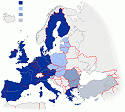EU's New States Lost in the Translation

Less than two months before 10 new member states join the European Union , it has emerged that about half have failed to translate the EU's 85,000-page rulebook into their national languages. The embarrassing disclosure could have serious legal consequences, because EU laws are only enforceable in the new member states when written in the national tongue.
Some countries began the vast translation exercise as long ago as 1996, but the complexity of the work - and a shortage of translators - has overwhelmed some accession candidates. «There is an urgent need for this to be done, or there will be problems in implementing EU law in some acceding states,» said a spokesman for Günter Verheugen, the EU enlargement commissioner. Malta, which battled to have Maltese accepted as an official EU language in spite of a chronic shortage of qualified translators, is in the worst predicament.
It admitted that by February 29, the target for completing the work, only 56,000 pages of the so-called acquis communautaire had been translated into Maltese and approved by Brussels, and that work had not started on a total of 15,000 pages.
Senior EU officials say the Czech Republic and the three Baltic states - Estonia, Latvia and Lithuania - are among those racing to complete the work by accession day on May 1.
The huge body of work, which includes the whole range of EU laws, objectives, court judgments and policies, is supposed to take effect in the new member states on the day they join.
Much of the rulebook covers Europe's single market, with laws directly applicable to companies, and there is also a large section covering agriculture.
Individuals could claim in the European Court of Justice that EU law did not apply to them if it had not been published in their native tongue, Mr Verheugen's spokesman said. And a mistranslation in any language could allow citizens of any member state to challenge EU law.
Malta said that all of the most important «operative» parts of the acquis would be published electronically by May 1. However it has agreed an extension for turning some of the dustier aspects of European law into Maltese until September 2004.
Mr Verheugen says that the «big bang» expansion of the EU from 15 to 25 is «the best prepared enlargement» ever undertaken, but some in Brussels are starting to wonder whether the new members are really ready.
By George Parker in Brussels
Financial Times, 6 March 2004



